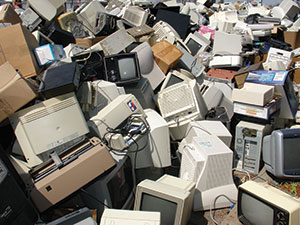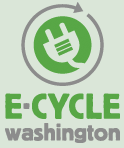Picture the USS John C. Stennis, the Nimitz-class aircraft carrier that calls Bremerton its home port. Or, to speed things up, just look at this photograph:
 Now think about all the electronic devices we surround ourselves with, those beeping, blinking, glowing, humming things that keep us entertained, in touch and even, on occasion, productive. Desktop computers. Monitors. Laptops. TVs. Tablets. E-readers. Compared to a modern nuclear-powered flattop, which can be expected to stay in service for about half a century, our e-toys have life spans more closely akin to that of a mayfly. One day soon, new iAndroPads may just come with an expiration date stamped on the back in blue ink, like a gallon of milk.
Now think about all the electronic devices we surround ourselves with, those beeping, blinking, glowing, humming things that keep us entertained, in touch and even, on occasion, productive. Desktop computers. Monitors. Laptops. TVs. Tablets. E-readers. Compared to a modern nuclear-powered flattop, which can be expected to stay in service for about half a century, our e-toys have life spans more closely akin to that of a mayfly. One day soon, new iAndroPads may just come with an expiration date stamped on the back in blue ink, like a gallon of milk.
 Now – and here’s where it comes together – take one more look at the Stennis. She’s a big ship, 1100 feet long, 250 feet wide, 24 stories tall, displacing (weighing) 97,000 tons . . . which, mirabile dictu, is close to the 95,000+ tons of defunct electronic devices collected for recycling by E-Cycle Washington since that pioneering program became operational in 2009!
Now – and here’s where it comes together – take one more look at the Stennis. She’s a big ship, 1100 feet long, 250 feet wide, 24 stories tall, displacing (weighing) 97,000 tons . . . which, mirabile dictu, is close to the 95,000+ tons of defunct electronic devices collected for recycling by E-Cycle Washington since that pioneering program became operational in 2009!
That’s 191 million pounds of trash that didn’t end up in Washington landfills, and untold amounts of toxins that didn’t ooze their way into our lakes, streams, water tables and the Sound, not to mention our bodies.
 E-Cycle Washington dates back to 2006, when Democrat-sponsored legislation made Washington one of the first states to require the recycling of a range of potentially harmful electronic devices. After a planning period, collections began in 2009. Today E-Cycling has expanded to 25 states, with all but one of them opting for our Producer-Responsibility model, in which the manufacturers of the devices cover the costs of their recycling.
E-Cycle Washington dates back to 2006, when Democrat-sponsored legislation made Washington one of the first states to require the recycling of a range of potentially harmful electronic devices. After a planning period, collections began in 2009. Today E-Cycling has expanded to 25 states, with all but one of them opting for our Producer-Responsibility model, in which the manufacturers of the devices cover the costs of their recycling.
That’s good news for the families, small businesses, schools, local governments and non-profits who are able to utilize the service for free. And it’s good news for the manufacturers themselves, because when one of their products hits the recycle bin, there’s a good chance a new one will replace it.
For more information about E-Cycle Washington, including locations, rules, year-by-year and county-by-county data, visit their web site. And to see how electronic recycling is spreading throughout the U.S., in blue and red states alike, Electronic Recyclers International has a wealth of information.
